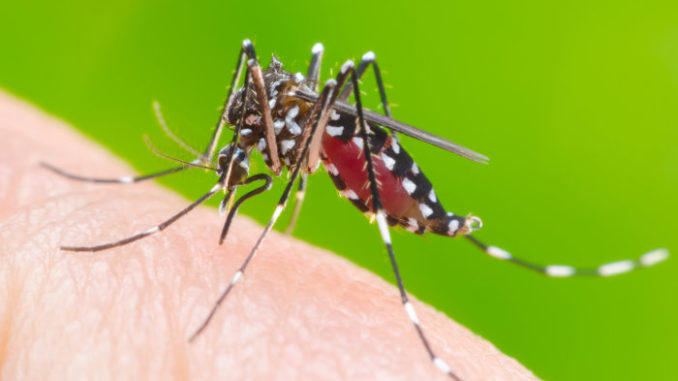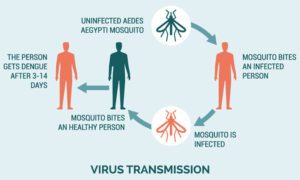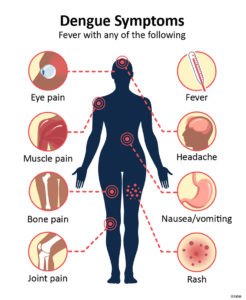
Table of Contents
What is Dengue?
- Dengue is a mosquito-borne viral disease transmitted to humans through the bite of infected mosquitoes
- Dengue is a viral infection that mainly occurs in the tropical and sub-tropical areas of the world.
- The primary vectors that transmit Dengue are Aedes aegypti mosquitoes and, to a lesser extent.
- The virus that is responsible for causing dengue is called dengue virus (DENV). Basically, there are four DENV serotypes and it is possible for a person to be infected four times.
- Dengue or dengue fever or ‘break bone fever’ is a tropical disease caused by any one of four closely related dengue viruses through bite of female Aedes mosquitoes.
- The alternative name ‘break bone fever’ comes from the associated muscles and joints pain.
Key Facts of Dengue
- Dengue is a tropical and subtropical disease that primarily affects urban and semi-urban settings.
- Aegypti andalbopictus mosquitoes are primarily responsible for transmitting dengue viruses to humans.
- Dengue can infect a person up to four times in their lifetime.
- About half of the world’s population is now at risk due to the sharp increase in dengue incidence worldwide. Although between 100 and 400 million infections are thought to occur annually, more than 80% are often minor and asymptomatic.
- Effective vector control methods are essential for preventing and controlling dengue. Long-term community involvement can significantly enhance vector control efforts.
- Dengue isn’t contagious from person to person. However, it can transmit from a pregnant women to their child.
- There is no specific treatment of dengue. Therefore, patients are treated symptomatically on the basis of symptoms.
Where is Dengue Found?
Dengue is particularly found in the following areas of the world:
- South East Asia
- The Caribbean
- South and Central America
- The Indian Subcontinent
- Pacific Islands
- Africa
- Australia
Causes of Dengue
- Any one of the four dengue virus types can cause dengue fever (DENV).
- There are four DENV serotypes, and each infection can result in a total of four infections.
- The Aedesaegypti mosquito or, less frequently, the Aedesalbopictus mosquito transmits them all.
Transmission of Dengue

Signs and Symptoms of Dengue

Major symptoms of dengue are:
- High fever- 104 F or more
- Headache
- Muscle pain
- Joint pain/bone pain
- Nausea
- Abdominal pain
- Vomiting
- Rashes
- Eye pain
- Loss of appetite
- Weakness/fatigue
Warning signs of dengue include:
- Belly pain, tenderness
- Vomiting (at least 3 times in 24 hours)
- Bleeding from the nose or gums
- Vomiting blood, or blood in the stool
- Feeling tired, restless, or irritable
- Difficult or rapid breathing
Risk Factors of Dengue
- The most significant risk factors for disease progression to are age, infection type, and co-morbidities like diabetes.
- Previous infection with DENV has been associated with increased risk to severe dengue.
- Urbanization (particularly unplanned urbanization) is also a risk factor for dengue transmission through a number of social and environmental factors.
- The population’s knowledge, attitude, and behavior about dengue also influence the community’s risks to dengue.
- Disease risks could vary and shift with climate change in tropical and subtropical regions, and vectors may be able to adapt to the new environment.
Diagnosis of Dengue
Dengue fever can be challenging to diagnose since its signs and symptoms are similar to those of other diseases such chikungunya, the Zika virus, malaria, and typhoid fever.
Present diagnostic methods for dengue include:
1. Virus isolation
- Cell culture is the most widely used method for dengue virus isolation.
2. Nucleic acid detection
- RT-PCR, Real-time RT-PCR or Isothermal amplification methods for the nucleic acid detection
3. Antigen detection
- Dengue viral antigen can be found in acetone-fixed leucocytes using fluorescent antibody, immunoperoxidase, and avidin-biotin enzyme tests.
4. Serological tests
- Dengue can be diagnosed by serological assays such as MAC-ELISA, Haemagglutination-inhibition test, IgM/IgG ratio, etc.
Prevention
The main method to prevent and control dengue transmission is through control of mosquito vector which can be achieved through following measures:
1. Prevention of mosquito breeding
- Environmental management and modification to prevent egg laying habitat
- Proper disposition of solid waste and destructions of man-made habitat that can hold water
- Domestic water storage should be covered, emptied or cleaned
- Use of appropriate insecticides to water storage outdoor containers
2. Personal protection from mosquito bites
- Use of repellents, even indoors
- Wearing long-sleeves dress to minimize the skin exposure
3. Community engagement
- Educating community about the risks of diseases spread by mosquitoes;
- Engaging the community to increase involvement and mobilization for sustained vector control
4. Active mosquito and virus surveillance
- To ascertain the efficacy of control strategies, active monitoring and surveillance of vector abundance and species composition should be conducted;
- Actively screen sentinel mosquito collections to prospectively monitor viral prevalence in the mosquito population;
- Clinical and environmental surveillance can be integrated with vector surveillance.
Treatment
- There is no specific treatment for dengue fever. Dengue is only treated symptomatically.
- Drink a lot of fluids while recovering from dengue fever.
- The OTC medication acetaminophen (Tylenol, among others) can help lower fever and muscle pain.
- However, using aspirin, ibuprofen (Advil, Motrin IB, and other brands), and naproxen sodium while having dengue fever (Aleve) is not suggested. These painkillers increase dengue fever bleeding complications
- Patient with severe dengue may need:
- supportive care in hospital
- fluid and electrolyte replacement intravenously (IV)
- monitoring blood pressure
- blood transfusion to replenish lost blood
Vaccination
CDC recommends dengue vaccination with Dengvaxia for children 9 through 16 years old, but only if they have already contracted the disease and reside in dengue-prone areas
WHO Response
WHO takes the following actions in response to dengue:
- Supports nations in the confirmation of outbreaks through its collaborative network of laboratories,
- Offers technical assistance and direction to nations for the efficient management of dengue epidemics;
- Provides training in clinical management, diagnosis, and vector control at the national and regional levels
- Develops evidence-based plans and policies and supports nations in improving their reporting systems and capturing the full burden of the disease
- Supports nations in the creation of dengue prevention and control programs and adoption of the Global Vector Control Response (2017-2030), which examines the development of new tools including pesticide products and application technologies
- Reviews the development of new tools, including insecticide products and application technologies;
- Gathers official records of dengue and severe dengue from over 100 Member States; and
- Publishes guidelines and handbooks for surveillance, case management, diagnosis, dengue prevention and control for Member States.
References and For More Information
https://www.who.int/news-room/fact-sheets/detail/dengue-and-severe-dengue
https://www.mayoclinic.org/diseases-conditions/dengue-fever/symptoms-causes/syc-20353078
https://www.cdc.gov/dengue/index.html
https://www.nhs.uk/conditions/dengue/
https://www.cdc.gov/dengue/symptoms/index.html#anchor_1555426819180
https://www.ncbi.nlm.nih.gov/pmc/articles/PMC7810113/
https://www.ncbi.nlm.nih.gov/books/NBK143156/
https://www.webmd.com/a-to-z-guides/dengue-fever-reference
https://my.clevelandclinic.org/health/diseases/17753-dengue-fever
https://medlineplus.gov/dengue.html